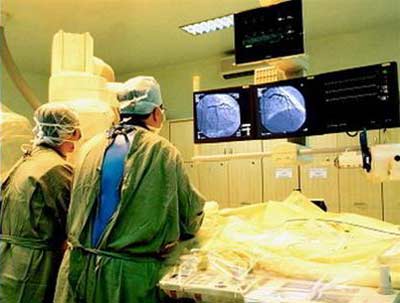High blood fat: don't underestimate!
This type of disease is increasing according to the pace of social development. The disease has no obvious symptoms but very dangerous because many unpredictable consequences .
Unpredictable consequences
According to Dr. Tran Trieu Thanh Truc - Trung Vuong Hospital (BV) emergency department - high blood fat (lipid) consists of primary causes: family-like (with family members and relatives sick); secondary: due to other diseases such as hypothyroidism, hyperthyroidism, nephrotic syndrome, diabetes, hypopituitarism, alcohol .
A person who has fat in the blood often has no obvious symptoms. Most of the diseases were discovered accidentally by the patient (patient) on a regular health check-up or for examination of symptoms of another disease such as diabetes, high blood pressure, or epigastric abdominal pain .

Blood vessel angiography to diagnose cardiovascular disease at University Hospital
Medicine - HCMC (Photo: BV)
Dr. Thanh Truc said that dyslipidemia if not well controlled will lead to many dangerous diseases. Specifically, when harmful lipids increase (increased triglyceride, LDL cholesterol), there will be deposits of these substances in the walls of blood vessels, causing atherosclerosis, which means narrowing of the blood vessels. If left untreated, this fat layer is getting thicker and can clog the vein, resulting in insufficient blood volume to feed the organs.
Depending on the area of the damaged blood vessels, there are different manifestations: high blood pressure or stroke, hemiplegia; anemia to myocardium causing angina, myocardial infarction; anemia or embolism in the leg that causes the foot to go back and forth (cold feet with purple pain when walking for a while, resting for less pain), black and purple necrosis of the feet and toes depending on the location of the blocked circuit; acute pancreatitis.
Diet and exercise
Doctor Nguyen Thi Hoa - head of the Nutrition Department of Children's Hospital 1 - said obese children also have high blood fat.The study of Dr. Nguyen Thi Hoa on obese 330 patients from 24 months to 15 years showed that 86.7% of children have high blood fat rate.
Among them, 74.3% of patients with high tryglyceride, 12.3% of patients with cholesterol, 13.9% had higher LDL and 11.7% had HDL lower than normal.In addition, 60.9% of patients had fatty liver.
Doctor Ly Huy Khanh - deputy manager of Trung Vuong Rescue Hospital - said that in developed countries, most deaths were due to heart disease (32%), mainly due to atherosclerosis. In our country, atherosclerosis with manifestations of coronary insufficiency, sudden death, myocardial infarction, cerebral infarction . is increasingly increasing according to the pace of social development.
Men over 40 and menopausal women or over 50 years of age, people with high risk factors such as smoking, hypertension, people with diabetes, obesity in the abdomen, family history of people with heart disease circuits must be regularly examined to detect hyperlipidemia. If there is no high risk factor, follow up at least every five years; If there is a high risk factor, follow up every year.
Regarding treatment, according to Dr. Thanh Truc, hyperlipidemia can be treated and controlled before it is too late. This adjustment must first start from the diet. Do not rush to take medicine immediately. If you are obese, you must lose weight; reduce the consumption of animal fat and instead eat vegetable oil, eat a lot of fish, eat lots of vegetables, drink soy milk.
If cholesterol is increased, eat less foods high in cholesterol such as kidneys, brains, liver, eggs, butter, copper shrimp .; limiting alcohol, especially when there is an increase in triglyceride content. At the same time, physical activity must be strengthened: physical exercise, walking, swimming. Physical activity increases HDL. Exercise for at least 30 minutes / day, every day or three times a week.
If you have only mild and moderate dyslipidemia, you only need to take a diet with weight loss, when you do not have the results, you will need to take the medicine but still have to maintain a diet and exercise do exercise. Every three months recheck the values of blood lipid once.
LE THANH HA
- What is high blood pressure for each subject?
- What should I pay attention to on New Year's Day?
- If you experience these 4 phenomena when you sleep, you should see a doctor right before you die because of a stroke
- Sleep immediately after lunch is prone to high blood pressure
- There is a link between sleep and high blood pressure
- The elixir helps you reduce blood fat
- Find out the secret of increasing blood pressure
- Find a simple 'medicine' to treat high blood pressure
- High blood pressure is
- High blood pressure in children
- Cure high blood pressure with radio waves
- High blood pressure increases the risk of dementia in middle age by 45%
 Green tea cleans teeth better than mouthwash?
Green tea cleans teeth better than mouthwash? Death kiss: This is why you should not let anyone kiss your baby's lips
Death kiss: This is why you should not let anyone kiss your baby's lips What is salmonellosis?
What is salmonellosis? Caution should be exercised when using aloe vera through eating and drinking
Caution should be exercised when using aloe vera through eating and drinking